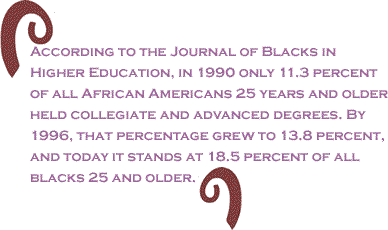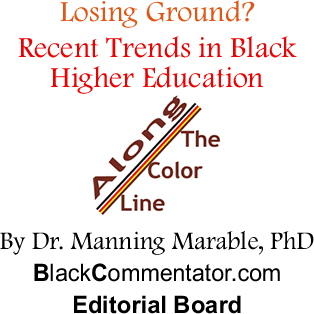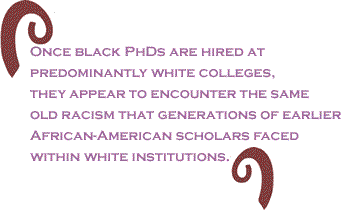
|
||||||||||||||||||||||
 |
||||||||||||||||||||||
 |
||||||||||||||||||||||
 |
||||||||||||||||||||||
 |
| The current issue is always free to everyone |
|
|
 |
 |
For generations, African-American parents have told their children that the surest path to professional advancement is a college education. The good news is that millions of African Americans are attending colleges, and thousands more are enrolled in graduate and professional schools. But in the aftermath of the 2003 Grutter v. Bollinger Supreme Court decision, and legislative and electoral assaults on affirmative action, a decidedly mixed picture emerges on the state of blacks in higher education. First, some positive news. According to the Journal of Blacks in Higher Education (Winter 2007-2008 issue), as of 2007, about 4 million African Americans hold a bachelor’s degree, representing 18.5 percent of all blacks 25 years and older. Of that group, nearly one million (952,000) also hold master’s degrees. About 166,000 African Americans have earned professional degrees in fields such as medicine, business, engineering and law. And approximately 111,000 blacks in America now hold PhDs. These statistics represent a remarkable expansion in the access to higher education that African Americans have experienced over the past two decades, despite the public assault against affirmative action. To place this growth into perspective, according to the Journal of Blacks in Higher Education, in 1990 only 11.3 percent of all African Americans 25 years and older held collegiate and advanced degrees. By 1996, that percentage grew to 13.8 percent, and today it stands at 18.5 percent of all blacks 25 and older. By comparison, about 31 percent of all whites 25 years and older hold college and advanced degrees. Several factors explain the continuing growth
of black enrollments in America’s colleges and universities.
First, despite the pressures to outlaw affirmative action enforcement
and diversity, over the past ten years the majority of the 26
most prestigious research universities have redoubled their
efforts to recruit African-American and Latino undergraduate
students. Nineteen of these institutions posted gains in African-American
freshman enrollment between 1997 and 2007, including: the University
of Chicago, 43 black freshmen in 1997 to 91 in 2007, an increase
of 111.6 percent; Emory University, 84 to 121
What explains these statistics? First, the pool of highly competitive, academically-prepared African-American high school students has grown significantly over the past 10 to 15 years. The size of the black middle and professional class has more than doubled, and the majority of these black students are drawn from these relatively privileged households. Secondly, universities and elite colleges are probably overcompensating for the dismantling of affirmative action and minority-oriented recruitment and retention programs, which were the result of Grutter v. Bollinger and state referenda like California’s 1996 Proposition 209. By elevating the black admissions rate, elite schools are making sure that minorities will be well represented in their matriculating classes. A similar success story, at first glance, seemingly exists for African-American graduate students. Back in 1987, only 787 blacks earned PhDs in the United States. By 2004, 1869 African Americans earned doctorates, representing 7.1. percent of all PhDs granted that year. However, for the next two years, the number of African Americans granted PhDs fell – down to 1,688 in 2005 and 1,659 in 2006. The profile of African-American PhDs is strikingly different from most white doctorates. On average, black Americans take 12.5 years to earn a doctorate after receiving their bachelor’s degrees, compared to ten years for white PhDs. The average age of an African-American PhD recipient is 36.7 years, compared to 33.4 years for white Americans. As the Journal of Blacks in Higher Education noted, “It appears that the predominantly white faculties of our major research universities prefer white teaching assistants over black teaching assistants. About 16.7 percent of white Americans who earned doctorates in 2006 served as teaching assistants during their doctoral study,” compared to only 6.9 percent of black PhD students. There’s also evidence that many white PhDs plan to use their doctorates in private business more than African Americans. More than two-thirds, 68 percent, of all African-American PhD recipients plan to obtain jobs in higher education, compared to only 57 percent of white PhDs. Over 15 percent of white doctorates expect to obtain employment inside industry and business; only 9.1 percent of black doctorates have similar plans.
Once black PhDs are hired at predominantly white colleges, they appear to encounter the same old racism that generations of earlier African-American scholars faced within white institutions. From 1993 to 2003, the number of African Americans in tenured faculty positions increased by 20 percent, up from 10,555 to 12,707; however, the percentage of African-American faculty who have been awarded tenure has actually declined, from 40.8 percent in 1993 down to 38.1 percent in 2003. At least 70 percent of all black PhDs aren’t even employed in full-time jobs. They hold part-time, adjunct and half-time positions, many of which have no pensions or medical benefits. The bottom line in higher education is that the overall numbers of African Americans are continuing to increase. Yet the patterns of racial inequality and unfairness—from tenure decisions to the difficulties black graduate students have in finding employment as teaching assistants—continue to exist. BlackCommentator.com Editorial Board member, Manning Marable, PhD is one
of
|
Your comments are always welcome. e-Mail
re-print notice
If you send us an e-Mail message we may publish all or part of it, unless you tell us it is not for publication. You may also request that we withhold your name. Thank you very much for your readership. |
|
| March 27, 2008 Issue 270 |
|
| Executive Editor: Bill Fletcher, Jr. |
| Publisher: Peter Gamble |
| Est. April 5, 2002 |
| Printer Friendly Version in resizeable plain text format format |
 |
 |
 |
| |
| |





























